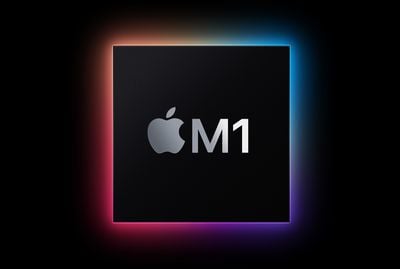Qualcomm's M1 Rival to Be Available in PCs by Late 2023
Qualcomm's answer to Apple silicon will be available in devices by late 2023, the company's CEO said earlier this week (via Tom's Hardware).

In November last year, Qualcomm announced plans to build next-generation Arm-based System on Chips (SoCs), designed to rival Apple's M-series chips, for the PC market. The chips are "designed to set the performance benchmark for Windows PCs" and are being developed by the Nuvia team. Qualcomm said that it will directly compete with Apple's M-series chips, including the M1, M1 Pro, and M1 Max, and hopes to lead the industry for "sustained performance and battery life."
During the company's latest earnings call earlier this week, Qualcomm President and CEO Christian Amon said that the Nuvia team was progressing toward its goal of developing a significant leap forward for Arm processors. Amon added that the first Nuvia-designed processor will be "going after the performance tier" and that Nuvia-powered Windows laptops are on track to be available to customers by late 2023.
The timing seems to indicate a slight delay compared to the original 2023 timeframe set out by Qualcomm last year. The company previously said that sample Nuvia chips would be available to device manufacturers by August 2022, but now that expectation has been broadened to the second half of 2022, with particular emphasis on the debut of the first consumer Nuvia devices in "late" 2023.
Qualcomm acquired Nuvia, a chip startup company founded by ex-Apple chip designers, for $1.4 billion in January 2021. The former Apple engineers wanted to create Arm-based SoCs specifically for servers and target the always-connected PC (ACPC) market with a chip that could compete with the M1, but now the team's aims seem to have been significantly broadened.
By late 2023, Apple is expected to be well into its M2 series of chips. The company may have even introduced the first M3 chips by the time the first Nuvia chips come to market.
Popular Stories
Apple is preparing a "bold" new iPhone Pro model for the iPhone's 20th anniversary in 2027, according to Bloomberg's Mark Gurman. As part of what's being described as a "major shake-up," Apple is said to be developing a design that makes more extensive use of glass – and this could point directly to the display itself.
Here's the case for Apple releasing a truly all-screen iPhone with no...
While the iPhone 17 Pro and iPhone 17 Pro Max are not expected to launch until September, there are already plenty of rumors about the devices.
Below, we recap key changes rumored for the iPhone 17 Pro models as of April 2025:
Aluminum frame: iPhone 17 Pro models are rumored to have an aluminum frame, whereas the iPhone 15 Pro and iPhone 16 Pro models have a titanium frame, and the iPhone ...
The first iOS 19 beta is less than two months away, and there are already a handful of new features that are expected with the update.
Apple should release the first iOS 19 beta to developers immediately following the WWDC 2025 keynote, which is scheduled for Monday, June 9. Following beta testing, the update should be released to the general public in September.
Below, we recap the key...
If you have been experiencing issues with wireless CarPlay in your vehicle lately, it was likely due to a software bug that has now been fixed.
Apple released iOS 18.4.1 today, and the update's release notes say it "addresses a rare issue that prevents wireless CarPlay connection in certain vehicles."
If wireless CarPlay was acting up for you, updating your iPhone to iOS 18.4.1 should...
Apple's iPhone development roadmap runs several years into the future and the company is continually working with suppliers on several successive iPhone models simultaneously, which is why we often get rumored features months ahead of launch. The iPhone 17 series is no different, and we already have a good idea of what to expect from Apple's 2025 smartphone lineup.
If you skipped the iPhone...
Apple may have updated several iPads and Macs late last year and early this year, but there are still multiple new devices that we're looking forward to seeing in 2025. Most will come in September or October, but there could be a few surprises before then.
We've rounded up a list of everything that we're still waiting to see from Apple in 2025.
iPhone 17, 17 Air, and 17 Pro - We get...
Apple today released iOS 18.4.1 and iPadOS 18.4.1, minor updates to the iOS 18 and iPadOS 18 operating systems that came out last September. iOS 18.4.1 and iPadOS 18.4.1 come two weeks after the launch of iOS 18.4 and iPadOS 18.4.
The new software can be downloaded on eligible iPhones and iPads over-the-air by going to Settings > General > Software Update.
There have been complaints about ...
Apple today updated its vintage products list to add the 2018 Mac mini and the iPhone 6s, devices that will get more limited service and repairs now that they are considered vintage.
The iPhone 6s initially launched in 2015, but Apple kept it around as a low-cost device until 2018, which is why it is only now being added to the vintage list. The iPhone 6s had Apple's A9 chip, and it was...
Apple today released macOS Sequoia 15.4.1, a minor update to the macOS Sequoia operating system that launched in September. macOS Sequoia 15.4.1 comes two weeks after the launch of macOS Sequoia 15.4.
Mac users can download the macOS Sequoia update through the Software Update section of System Settings. It is available for free on all Macs able to run macOS 15.
According to...
























